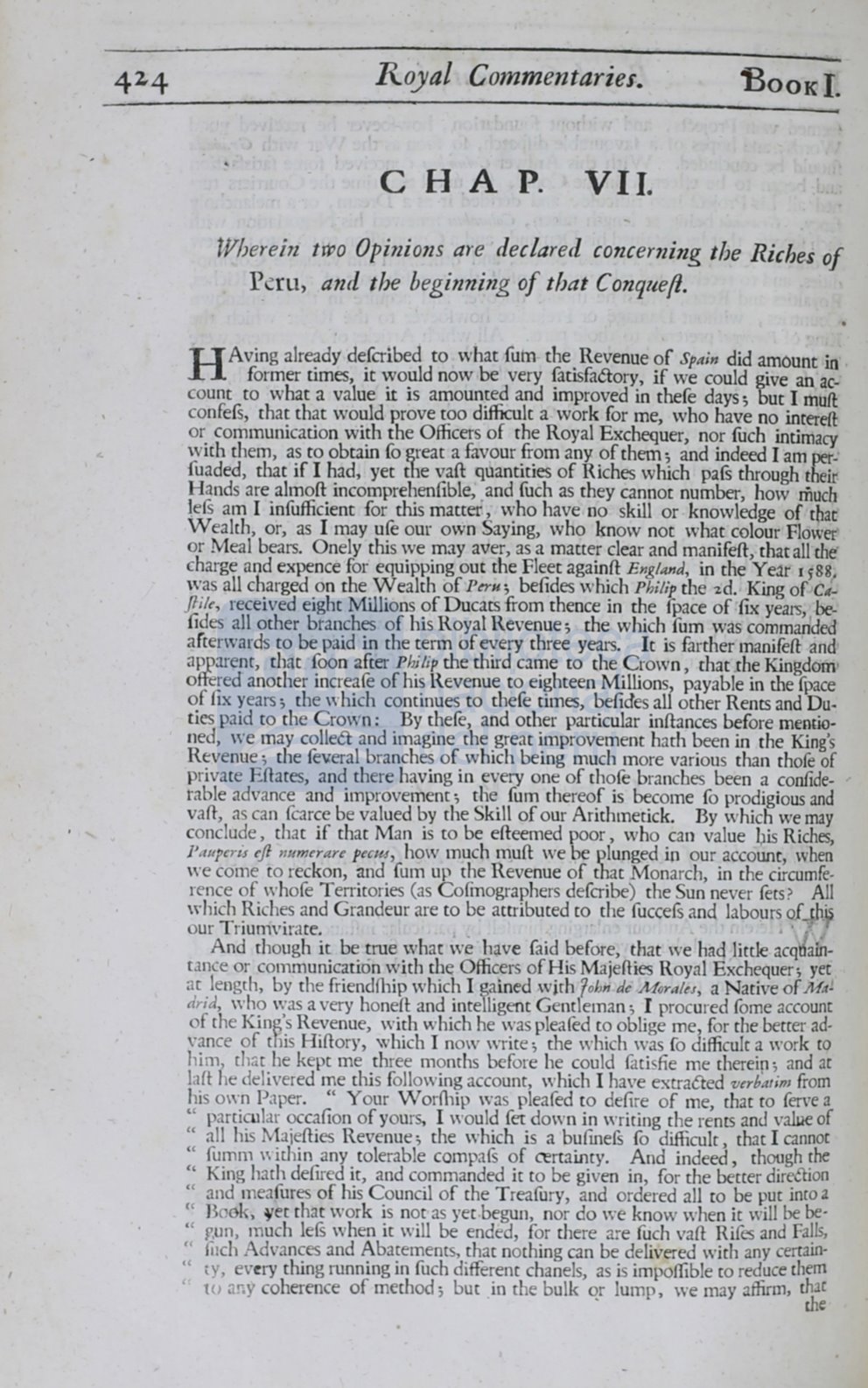

Royal
Commentaries.
CH AP.
VII.
t//herein
two Opinions
are declared concerning
the
Riches of
r
r '
and the beginning of that
c
onquefl.
H
Aving already defcribed to what
fum
the Revenue of
Spain
did
amount
in
former times,
it
would now be very fatisfaetory,
if
we could give an ac–
count to what
a
value
it
is
amounted and improved
in
thefe days; but
I
mull:
confefs, that that would prove too
difficult a
work for
me,
who
have
no
interell:
or communication with the Officers of the Royal Exchequer, nor fuch
intimacy
\ ith them, as to obtain fo great a favour from any of them; and indeed
I
am per..
fuaded,
that
if
I
had,
yet
the vaft quantities of Riches which pafs through
their
ands are almoft incomprehenfible, and Cuch
as
they cannot number, how
much
lefs am
I
infufficient
for this
matter, who have no
skill
or knowledge of that
W
alth, or, as
I
may
u[e
our own Saying, who know not what colour
Flower
or Meal bears. Onely this we may aver, as a matter clear and rnanifeft, that all the
barge and expence
for
equipping out the Fleet againfi
Englttnd,
in
the Year
1188.
wa all charged on the Wealth of
Peru;
befides
~
hich
Philip
the
2d.
King
of
Ca–
ftile
received eight Millions of Ducats from thence in the fpace of
fix
years,
be–
fide all other branches of his Royal Revenue; the which furn was commanded
aftenvards to be paid
in
the term
ofevery
three
years.
It
is
farther
manifefi
and
apparent, that
foon
after
Phjlip
the
third
came to the Crown, that the Kingdom
offered another increafe
of his
Revenue
to
eighteen Millions, payable
in
the [pace
of fix years; the Yrhich continues to tbefe times, befides all other Rents and Du..
ties aid to the Crm n :
By
rhefe, and other particular infrances before mfntio–
ned, \Ve may colleCl: and imagine the great improvement hath been
in
the King'
Re enue; the feveral branches of which eing much more various than thofe of
rivare Jfiares, and there having in every one of thofe branche been a confide–
rable ad ance and impro ement; the furn thereof is become
fo
prodigious
and
alt,
a can fcarce be valued by the kill of our Arithmetick. By which we
may
cone ude, that if that Man i to be efteemed poor, who can value
l;iis
Riches,
Pauperu eft
numerare
pect-U,
hm much mufi
\~
e be plunged
in
our accowlC,
when
,,·e come to reckon, and furn up the Revenue of that Monarch,
in
the circumfe–
r nee
f wh fe Territories (as Cofmographers defcribe) the un ne er fers?
All
\ hi h
i he and Grandeur are to be attributed co the fuccefs and labours of_rb·
ur Trium\ irate.
And though
it
be true
v
hat \\'e have faid before, that we had little acqnain–
tan e r communication
ith
the
Officer ofH. Majeflies Royal Exchequer; yet
at length,
y
the fri ndfhip \\ hich I gained \ irh
(ohn de
Moralei,
a
ative of
Ma–
arid,
who ' · a ery honeH: and intelligent G mlernan; I
ro ured fame account
f
c e King'
venue, with which he wa pleafed
to
oblige me, for the better ad-
·ance of
thi
Hifl:or .,, \'hi h I n v \'Hite; the which ' a
fo
difficult a work co
him,
t
1a
he k
t
me three months
fore he could fati fie me therein; and at
hft
he 1eli\ ered me this following a count '' hich I have
e~
traCted
verbatim
from
h1
m ·n
a er.
" Your
orfhi
\Va
leafed to
fire of me, chat ro
fen
ea
' p rci
la.r
cafion of y ur
I would
f
et
dm' n in ,,·ricing t e rents and
alJJe
of
<
a
h'
fai
fij
e enue; the \vhi h
i
a bufineQ fo
difficult,
that I cannot
' fumm \\ ithin ny tolera
e
com
a~
of
rtaimy. And ind ed, though the
"
ing h
t1
defir d it, and omman ed it to be gi en
in,
for the better dir
ion
<c
and
1 1
a ur
of
his
oun
il
of rhe Treafury, and ord red all ro be put into
<
J
>
et that i\'ork
i
not as ; et begun, nor o ' ·e kno
\.Yhen
it
\.\ill e be,
' ' gun,
1
u h 1
rs
wh n
it '
ill
e en e
for there
..e uch all
Rill and
F~ls,
" nch _
\. nc
and Abatement
that nothing can be ell ered
\.Yith
any
ertalll,
\..ery
thing running in
fu
h d. erent hanel , a · im offib e co reduce chem
< --,
oher nee of echod; but in
e bulk
r
y
ffirm,
t~L
c
~
u1e














